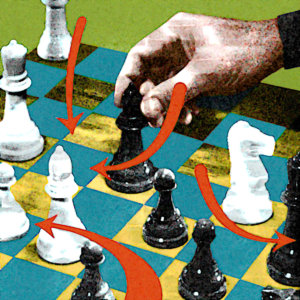How Scenario Planning Influences Strategic Decisions
A recent study sheds light on how the use of scenario planning affects executives’ strategic choices.
The use of scenario planning once saved a credit union that had had Enron Corp. as its sole corporate sponsor. In their 2009 MIT Sloan Management Review article, “How to Make Sense of Weak Signals,” Paul J.H. Schoemaker and George S. Day described how, after Enron’s sudden collapse into Chapter 11 bankruptcy and scandal in 2001, the credit union survived, rather unexpectedly, because its management had taken previous actions to reduce its dependence on Enron. Management took these actions after considering scenarios in which the credit union could not depend on Enron for its growth.
Another example of a strategic decision influenced by the use of scenario planning is UPS’ acquisition of Mail Boxes Etc. in 2001. This acquisition gave UPS more than 3,500 retail store locations in the U.S. to complement its network of large hubs used as mail-sorting facilities. A scenario called “Brave New World” — one of four scenarios UPS senior managers considered in formulating the company’s strategy — was a huge influence on the acquisition decision. The “Brave New World” scenario described a deregulated, globalized marketplace — markedly different from the world UPS was operating in in 2001. It was this scenario that convinced management to invest in retail locations.
Despite such anecdotal examples illustrating the power of scenario planning, empirical evidence of the effect of scenario planning on executive judgment is almost nonexistent. That fact is surprising, considering not only that executives use this method to make important decisions, but also that the method requires extensive resources. What’s more, the few experimental studies of scenario planning that have been conducted reach conflicting conclusions.
To examine whether scenario planning produces measurable benefits, we conducted several workshops, examining whether — and how — the practice of scenario planning would influence various experts making long-term investment decisions.
Scenario-Planning Workshops
As part of a U.S. infrastructure initiative called Future Freight Flows, which was sponsored by the National Cooperative Highway Research Program, we designed and ran several workshops for leaders from private-sector companies and public-sector transportation-planning agencies in the United States (for example, state Departments of Transportation and regional planning commissions). Long-range planning of transportation infrastructure is an ideal context in which to apply scenario planning. That’s because the planning and implementation can take several years — and most elements of transportation infrastructure have life spans of decades.


Comment (1)
Kheepe Moremi